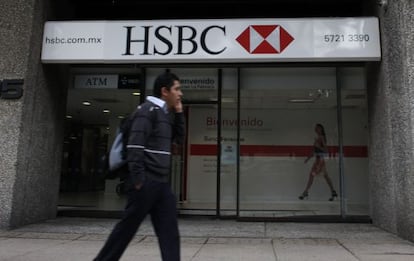HSBC shipped billions in cash to US on behalf of Mexico's drug cartels
Anti-money laundering controls need to be tightened, says Mexican regulator

British banking giant HSBC for years shipped billions of dollars in cash belonging to the Mexican drug cartels to be deposited in the United States despite warnings from banking regulators in Washington and Mexico City, according to the results of a US Senate investigation released on Monday.
The more than 400-page report compiled by the Senate's Permanent Subcommittee on Investigations was made public on the eve of a hearing in which officials from HSBC Holdings Plc were called to before the panel to explain how the bank acted as a financier to shady clients in Mexico, Iran and Syria by routing their money to the United States.
Apologetic HSBC officials said Tuesday that they were shutting down bank affiliates in "high-risk areas," such as the Cayman Islands, where Mexican drug cartels hold offshore dollar accounts. Some 20,000 accounts in the Caribbean archipelago are to be closed. At the same time the bank's top anti-money laundering compliance officer David Bagley told the Senate committee that he was stepping down.
Paul Thurston, who served as head of the Mexican affiliate HBMX from 2007 and 2008, described to the panel the frustrations he experienced.
Mexican and US authorities expressed concern that cash shipments included illegal drug proceeds"
"The environment in Mexico was the most challenging one we had ever experienced," said Thurston, who is now chief executive of HSBC's retail banking and wealth management. "Bank managers operated like they were the owners of a franchise, with a high level of autonomy [...] At the same time, bank employees became the targets for bribery, extortions and even kidnappings."
The Mexican bank, which HSBC acquired in 2002, was a "fast-growing" bank that lacked controls against money laundering, Thurston said.
According to the executive summary of the report, HBMX was "the single largest exporter of US dollars" to the United States between 2006-2007, shipping over $7 billion in cash.
"Mexican and US authorities expressed repeated concern that HBMX's bulk cash shipments could reach that volume only if they included illegal drug proceeds," the summary stated "The concern was that drug traffickers unable to deposit large amounts of cash in US banks due to [anti-money laundering] controls, were transporting US dollars to Mexico, arranging for bulk deposits there, and then using Mexican financial institutions to insert the cash back into the US financial system."
The US Justice Department is currently investigating the bank's dealings.
Guillermo Babatz, the president of Mexico's National Banking and Securities Commission (CNBV), acknowledged that the country's financial sector was "vulnerable" to money laundering by the drug cartels and said that there must be more oversight on money transfers, not only at banks but at wire remittance agencies.
"We had been very much aware that [HSBC] dollar transactions were creating problems to the system," Babatz told the Mexico City daily El Universal in an interview published on its website Wednesday.
"We went fully onto the attack. In fact, we had high-level meetings with executives and regulators from [the HBMX] parent company, and from that meeting the bank started looking for tough solutions."
In June 2010, the Mexican Department of Treasury issued new guidelines for all banks, wire-transfer agencies and other financial institutions limiting the amount of cash in dollars that can be transferred.
Tu suscripción se está usando en otro dispositivo
¿Quieres añadir otro usuario a tu suscripción?
Si continúas leyendo en este dispositivo, no se podrá leer en el otro.
FlechaTu suscripción se está usando en otro dispositivo y solo puedes acceder a EL PAÍS desde un dispositivo a la vez.
Si quieres compartir tu cuenta, cambia tu suscripción a la modalidad Premium, así podrás añadir otro usuario. Cada uno accederá con su propia cuenta de email, lo que os permitirá personalizar vuestra experiencia en EL PAÍS.
¿Tienes una suscripción de empresa? Accede aquí para contratar más cuentas.
En el caso de no saber quién está usando tu cuenta, te recomendamos cambiar tu contraseña aquí.
Si decides continuar compartiendo tu cuenta, este mensaje se mostrará en tu dispositivo y en el de la otra persona que está usando tu cuenta de forma indefinida, afectando a tu experiencia de lectura. Puedes consultar aquí los términos y condiciones de la suscripción digital.








































